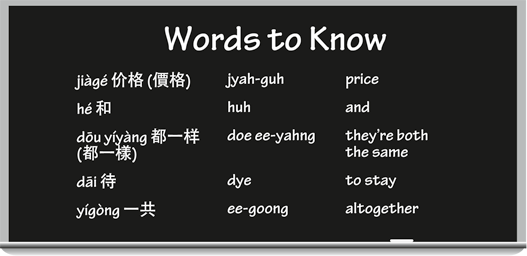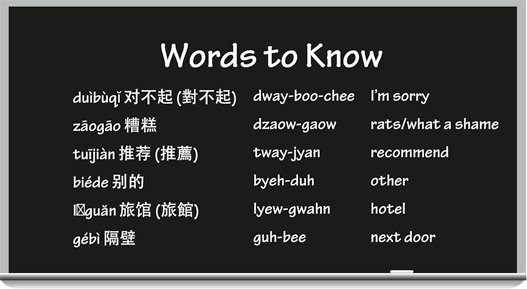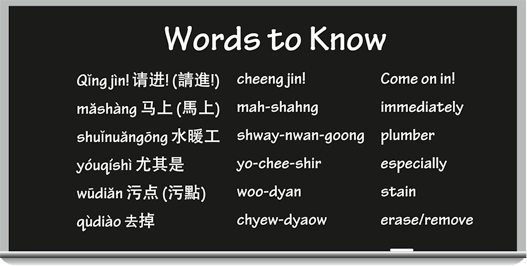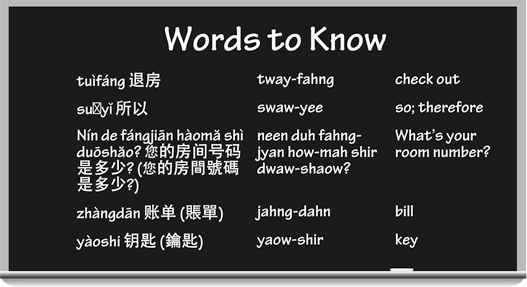Chapter 18
Finding a Place to Stay
In This Chapter
 Booking your room reservation
Booking your room reservation
 Checking in upon arrival
Checking in upon arrival
 Requesting hotel service
Requesting hotel service
 Paying your bill
Paying your bill
The right hotel can make or break a vacation. Whether you stay in a capital city or a little backwater town with only one hotel to its name, you still need to know how to check in, check out, and ask for anything you need in between (including the bill). This chapter runs you through the gamut of booking your hotel, checking in at the front desk, checking out at the designated time, and dealing with all sorts of issues that may come up in between.
 bīnguǎn 宾馆 (宾馆) (been-gwahn) (Literally: a place for guests)
bīnguǎn 宾馆 (宾馆) (been-gwahn) (Literally: a place for guests)
 fàndiàn 饭店 (飯店) (fahn-dyan) (Literally: a place for meals)
fàndiàn 饭店 (飯店) (fahn-dyan) (Literally: a place for meals)
 jiǔdiàn 酒店 (jyo-dyan) (Literally: a place for wine)
jiǔdiàn 酒店 (jyo-dyan) (Literally: a place for wine)
 lǚguǎn 旅馆 (旅館) (lyew-gwahn) (hotel)
lǚguǎn 旅馆 (旅館) (lyew-gwahn) (hotel)
 zhāodàisuǒ 招待所 (jaow-dye-swaw) (Literally: a place to receive people)
zhāodàisuǒ 招待所 (jaow-dye-swaw) (Literally: a place to receive people)
Making a Room Reservation
Thinking of yùdìng 预定 (預定) (yew-deeng) (reserving) a hotel fángjiān 房间 (房間) (fahng-jyan) (room)? What kind do you want? A single room all for yourself? A double room for you and your special someone? Or perhaps a suite for a special occasion like your 50th wedding anniversary?
You have many kinds of rooms to choose from, depending on your budget and your unique needs:
 dānrén fángjiān 单人房间 (單人房間) (dahn-run fahng-jyan) (single room)
dānrén fángjiān 单人房间 (單人房間) (dahn-run fahng-jyan) (single room)
 shuāngrén fángjiān 双人房间 (雙人房間) (shwahng-run fahng-jyan) (double room)
shuāngrén fángjiān 双人房间 (雙人房間) (shwahng-run fahng-jyan) (double room)
 tàojiān 套间 (套間) (taow-jyan) (a suite)
tàojiān 套间 (套間) (taow-jyan) (a suite)
 yíge ānjìng de fángjiān 一个安静的房间 (一個安靜的房間) (ee-guh ahn-jeeng duh fahng-jyan) (a quiet room)
yíge ānjìng de fángjiān 一个安静的房间 (一個安靜的房間) (ee-guh ahn-jeeng duh fahng-jyan) (a quiet room)
 yíge bù xīyān de fángjiān 一个不吸烟的房间 (一個不吸煙的房間) (ee-guh boo she-yan duh fahng-jyan) (a nonsmoking room)
yíge bù xīyān de fángjiān 一个不吸烟的房间 (一個不吸煙的房間) (ee-guh boo she-yan duh fahng-jyan) (a nonsmoking room)
 yíge cháo yuànzi de fángjiān 一个朝院子的房间 (一個朝院子的房間) (ee-guh chaow ywan-dzuh duh fahng-jyan) (a room facing the courtyard)
yíge cháo yuànzi de fángjiān 一个朝院子的房间 (一個朝院子的房間) (ee-guh chaow ywan-dzuh duh fahng-jyan) (a room facing the courtyard)
 yíge dài yángtái de fángjiān 一个带阳台的房间 (一個帶陽臺的房間) (ee-guh dye yahng-tye duh fahng-jyan) (a room with a balcony)
yíge dài yángtái de fángjiān 一个带阳台的房间 (一個帶陽臺的房間) (ee-guh dye yahng-tye duh fahng-jyan) (a room with a balcony)
 yíge fāngbiàn cánjí rén de fángjiān 一个方便残疾人的房间 (一個方便殘疾人的房間) (ee-guh fahng-byan tsahn-jee run duh fahng-jyan) (a room equipped for handicapped people)
yíge fāngbiàn cánjí rén de fángjiān 一个方便残疾人的房间 (一個方便殘疾人的房間) (ee-guh fahng-byan tsahn-jee run duh fahng-jyan) (a room equipped for handicapped people)
 yíge guāngxiàn hǎo de fǎngjiān 一个光线好的房间 (一個光線好的房間) (ee-guh gwahng-shyan how duh fahng-jyan) (a bright room)
yíge guāngxiàn hǎo de fǎngjiān 一个光线好的房间 (一個光線好的房間) (ee-guh gwahng-shyan how duh fahng-jyan) (a bright room)
 yíge hǎi jīng de fángjiān 一个海景的房间 (一個海景的房間) (ee-guh hi jeeng duh fahng-jyan) (a room with an ocean view)
yíge hǎi jīng de fángjiān 一个海景的房间 (一個海景的房間) (ee-guh hi jeeng duh fahng-jyan) (a room with an ocean view)
 yíge yǒu kōngtiáo de fángjiān 一个有空调的房间 (一個有空調的房間) (ee-guh yo koong-tyaow duh fahng-jyan) (a room with air conditioning)
yíge yǒu kōngtiáo de fángjiān 一个有空调的房间 (一個有空調的房間) (ee-guh yo koong-tyaow duh fahng-jyan) (a room with air conditioning)
Whatever the occasion and whatever kind of room you want, you need to know how to make a reservation. Just make sure you know your budget in advance (and stick to it). You’re sure to find a decent hotel no matter the price range if you spend some time checking out the competition.
Here are some things you may want to ask or specify over the phone as you begin the search for your ideal hotel:
 Nǐmen de fángjiān yǒu méiyǒu wǎngluò liánjié? 你们的房间有没有网络连接? (你們的房間有沒有網絡連接?) (nee-men duh fahng-jyan yo mayo wahng-lwaw lyan-jyeh?) (Do your rooms have Internet access?)
Nǐmen de fángjiān yǒu méiyǒu wǎngluò liánjié? 你们的房间有没有网络连接? (你們的房間有沒有網絡連接?) (nee-men duh fahng-jyan yo mayo wahng-lwaw lyan-jyeh?) (Do your rooms have Internet access?)
 Nǐmen hái yǒu fángjiān ma? 你们还有房间吗? (你們還有房間嗎? ) (nee-mun hi yo fahng-jyan mah?) (Do you have any rooms available?)
Nǐmen hái yǒu fángjiān ma? 你们还有房间吗? (你們還有房間嗎? ) (nee-mun hi yo fahng-jyan mah?) (Do you have any rooms available?)
 Nǐmen fángjiān de jiàgé shì duōshǎo? 你们房间的价格是多少? (你們房間的價格是多少?) (nee-mun fahng-jyan duh jyah-guh shir dwaw-shaow?) (How much are your rooms?)
Nǐmen fángjiān de jiàgé shì duōshǎo? 你们房间的价格是多少? (你們房間的價格是多少?) (nee-mun fahng-jyan duh jyah-guh shir dwaw-shaow?) (How much are your rooms?)
 Nǐmen shōu bù shōu xìnyòng kǎ? 你们收不收信用卡? (你們收不收信用卡?) (nee-men show boo show sheen-yoong kah?) (Do you accept credit cards?)
Nǐmen shōu bù shōu xìnyòng kǎ? 你们收不收信用卡? (你們收不收信用卡?) (nee-men show boo show sheen-yoong kah?) (Do you accept credit cards?)
 Wǒ yào yíge fángjiān zhù liǎng ge wǎnshàng. 我要一个房间住两个晚上. (我要一個房間住兩個晚上.) (waw yaow ee-guh fahng-jyan joo lyahng guh wahn-shahng.) (I’d like a room for two nights.)
Wǒ yào yíge fángjiān zhù liǎng ge wǎnshàng. 我要一个房间住两个晚上. (我要一個房間住兩個晚上.) (waw yaow ee-guh fahng-jyan joo lyahng guh wahn-shahng.) (I’d like a room for two nights.)
 Yǒu méiyǒu shāngwù zhōngxīn? 有没有商务中心? (有沒有商務中心?) (yo mayo shahng-woo joong-sheen?) (Is there a business center?)
Yǒu méiyǒu shāngwù zhōngxīn? 有没有商务中心? (有沒有商務中心?) (yo mayo shahng-woo joong-sheen?) (Is there a business center?)
When you do finally pick up your phone to reserve a room, make sure you have your credit card in front of you (refer to Chapter 15 for more money talk).
Talkin’ the Talk
Eli:
Qǐngwèn, nǐmen fángjiān de jiàgé shì duōshǎo?
cheeng-one, nee-men fahng-jyan duh jyah-guh shir dwaw-shaow?
May I ask, how much are your rooms?
Hotel clerk:
Wǒmen de fángjiān yì tiān wǎnshàng yì bǎi wǔ shí kuài měi yuán.
waw-men duh fahng-jyan ee tyan wahn-shahng ee bye woo shir kwye may ywan.
Our rooms are USD $150 per night.
Eli:
Nà shì dānrén fángjiān hái shì shuāngrén fángjiān de jiàgé?
nah shir dahn-run fahng-jyan hi shir shwahng-run fahng-jyan duh jyah-guh?
Is that the price of a single room or a double?
Hotel clerk:
Dānrén fángjiān hé shuāngrén fángjiān de jiàgé dōu yíyàng.
dahn-run fahng-jyan huh shwahng-run fahng-jyan duh jyah-guh doe ee-yahng.
The prices of our single and double rooms are the same.
Eli:
Hǎo jíle. Wǒ yào liǎngge dānrén fángjiān yíge shuāngrén fángjiān.
how jee-luh. waw yaow lyahng-guh dahn-run fahng-jyan ee-guh shwahng-run fahng-jyan.
Great. I’d like two single rooms and one double.
Hotel clerk:
Méiyǒu wèntí. Nǐmen yào dāi jǐ ge wǎnshàng?
mayo one-tee. nee-men yaow dye jee guh wahn-shahng?
No problem. How many nights will you be staying?
Eli:
Yígòng sān ge wǎnshàng.
ee-goong sahn guh wahn-shahng.
Altogether, three nights.
Hotel clerk:
Hǎo. Nà yígòng yìqiān sānbǎi wǔ shí kuài.
how. nah ee-goong jyo bye kwye.
Very well. That will be $1,350 altogether.

Checking In Before You Hit the Pool
Before you can take advantage of any conveniences your hotel offers (flip to the following section), you have to officially bànlǐ rùzhù shǒuxù 办理入住手续 (辦理入住手續) (bahn-lee roo-joo show-shyew) (check in). You don’t want to be caught red handed running in the gym or relaxing in the hot tub unless you’re a bona fide guest, right? (Don’t answer that.)
When you walk up to the fàndiàn qiántái 饭店前台 (飯店前台) (fahn-dyan chyan-tye) (reception desk), you invariably find yourself needing to say one of the following sentences:
 Nǐmen hái yǒu fángjiān ma? 你们还有房间吗? (你們還有房間嗎?) (nee-men hi yo fahng-jyan mah?) (Do you have any rooms available?)
Nǐmen hái yǒu fángjiān ma? 你们还有房间吗? (你們還有房間嗎?) (nee-men hi yo fahng-jyan mah?) (Do you have any rooms available?)
 Wǒ méiyǒu yùdìng fángjiān. 我没有预定房间. (我沒有預定房間.) (waw mayo yew-deeng fahng-jyan.) (I don’t have a reservation.)
Wǒ méiyǒu yùdìng fángjiān. 我没有预定房间. (我沒有預定房間.) (waw mayo yew-deeng fahng-jyan.) (I don’t have a reservation.)
 Wǒ yǐjīng yùdìng le fángjiān. 我已经预定了房间. (我已經預定了房間.) (waw ee-jeeng yew-deeng luh fahng-jyan.) (I already made a reservation.)
Wǒ yǐjīng yùdìng le fángjiān. 我已经预定了房间. (我已經預定了房間.) (waw ee-jeeng yew-deeng luh fahng-jyan.) (I already made a reservation.)
If you’re in luck, the hotel has at least one kōng 空 (koong) (empty/vacant) room. If the hotel has no available space, you’ll hear Duìbùqǐ, wǒmen kèmǎn le. 对不起, 我们客满了. (對不起, 我們客滿了.) (dway-boo-chee, waw-men kuh-mahn luh.) (Sorry, there are no vacancies./We’re full.)
The qiántái fúwùyuán 前台服务员 (前台服務員) (chyan-tye foo-woo-ywan) (front desk clerk) asks you to tián 填 (tyan) (fill out) a couple of biǎo 表 (byaow) (forms) to book your room, so have a pen and some form of zhèngjiàn 证件 (證件) (juhng-jyan) (ID) ready — especially your hùzhào 护照 (護照) (hoo-jaow) (passport). Voilà! You’re officially a hotel kèrén 客人 (kuh-run) (guest).
After you successfully manage to check in, a xíngliyuán 行李员 (行李員) (sheeng-lee-ywan) (porter/bellboy) immediately appears to help take your xíngli 行李 (sheeng-lee) (luggage) to your room. After he lets you in, he gives you the yàoshi 钥匙 (鑰匙) (yaow-shir) (key) if you didn’t get it from the qiántái fúwùyuán downstairs.
Talkin’ the Talk
Adele:
Nǐ hǎo. Qǐngwèn, nǐmen hái yǒu fángjiān ma?
nee how. cheeng-one, nee-men hi yo fahng-jyan mah?
Hello. May I ask, do you have any rooms available?
Clerk:
Duìbùqǐ, wǒmen jīntiān kèmǎn le. Méiyǒu kōng fángjiān le.
dway-boo-chee, waw-men jin-tyan kuh-mahn luh. mayo koong fahng-jyan luh.
I’m sorry, but we’re full today. There aren’t any vacant rooms.
Adele:
Zāogāo! Nǐ néng bù néng tuījiàn biéde lǚguǎn?
dzaow-gaow! nee nung boo nung tway-jyan byeh-duh lyew-gwahn?
Rats! Could you perhaps recommend another hotel, then?
Clerk:
Kéyǐ. Gébì de lǚguǎn yǒu kōng fángjiān. Nǐ zuì hǎo zǒu guò qù shì shì kàn.
kuh-yee. guh-bee duh lyew-gwahn yo koong fahng-jyan. nee dzway how dzoe gwaw chyew shir shir kahn.
Yes. The hotel next door has vacancies. You may as well walk over there and have a look.
Adele:
Xièxiè.
shyeh-shyeh.
Thank you.

Taking Advantage of Hotel Service
After you check into your hotel (refer to the preceding section), you may find yourself mysteriously lingering a bit in the dàtīng 大厅 (大廳) (dah-teeng) (lobby), visually casing the joint long enough to take in all sorts of amenities. The following sections introduce you to both the comfort services and customer services hotels have to offer.
 fúwùtái jīnglǐ 服务台经理 (服務台經理) (foo-woo-tye jeeng-lee) (concierge)
fúwùtái jīnglǐ 服务台经理 (服務台經理) (foo-woo-tye jeeng-lee) (concierge)
 fúwùyuán 服务员 (服務員) (foo-woo-ywan) (attendant)
fúwùyuán 服务员 (服務員) (foo-woo-ywan) (attendant)
 fúwùyuán lǐngbān 服务员领班 (服務員領班) (foo-woo-ywan leeng-bahn) (bell captain)
fúwùyuán lǐngbān 服务员领班 (服務員領班) (foo-woo-ywan leeng-bahn) (bell captain)
 zhùlǐ jīnglǐ 助理经理 (助理經理) (joo-lee jeeng-lee) (assistant manager)
zhùlǐ jīnglǐ 助理经理 (助理經理) (joo-lee jeeng-lee) (assistant manager)
 zǒngjīnglǐ 总经理 (總經理) (dzoong-jeeng-lee) (general manager)
zǒngjīnglǐ 总经理 (總經理) (dzoong-jeeng-lee) (general manager)
Counting on convenience
Most hotels let you put in for a wake-up call so that you don’t have to worry about setting an alarm. All you have to say is Qǐng nǐ jiào wǒ qǐchuáng. 请你叫我起床. (請你叫我起床.) (cheeng nee jyaow waw chee-chwahng.) (Literally: Please call me to get out of bed.)
After you’re awake, the luxuries at your disposal may include the following:
 ànmō yùgāng 按摩浴缸 (ahn-maw yew-gahng) (hot tub)
ànmō yùgāng 按摩浴缸 (ahn-maw yew-gahng) (hot tub)
 diànshì 电视 (電視) (dyan-shir) (television)
diànshì 电视 (電視) (dyan-shir) (television)
 gānxǐ fúwù 干洗服务 (乾洗服務) (gahn-she foo-woo) (dry cleaning service)
gānxǐ fúwù 干洗服务 (乾洗服務) (gahn-she foo-woo) (dry cleaning service)
 lǚguǎn fàndiàn 旅馆饭店 (旅館飯店) (lyew-gwahn fahn-dyan) (hotel restaurant)
lǚguǎn fàndiàn 旅馆饭店 (旅館飯店) (lyew-gwahn fahn-dyan) (hotel restaurant)
 shāngwù zhōngxīn 商务中心 (商務中心) (shahng-woo joong-sheen) (business center)
shāngwù zhōngxīn 商务中心 (商務中心) (shahng-woo joong-sheen) (business center)
 tǐyùguǎn 体育馆 (體育館) (tee-yew-gwahn) (gym)
tǐyùguǎn 体育馆 (體育館) (tee-yew-gwahn) (gym)
 xǐyī fúwù 洗衣服务 (洗衣服務) (she-ee foo-woo) (laundry service)
xǐyī fúwù 洗衣服务 (洗衣服務) (she-ee foo-woo) (laundry service)
 yóuyǒngchí 游泳池 (yo-yoong-chir) (swimming pool)
yóuyǒngchí 游泳池 (yo-yoong-chir) (swimming pool)
Getting problems fixed
Uh oh . . . you’re finally ensconced in your big, beautiful hotel room when you discover that the mén suǒ bú shàng 门鎖不上 (門鎖不上) (mun swaw boo shahng) (door doesn’t lock) and the kōngtiáo huài le 空调坏了 (空調壞了) (koong-tyaow hwye luh) (air conditioning doesn’t work). To make matters worse, your chuānghu dǎ bù kāi 窗户打不开 (窗戶打不開) (chwahng-hoo dah boo kye) (window won’t open). Heat wave! It may be hard to believe, but in addition to all that, your mǎtǒng dǔzhùle 马桶堵住了 (馬桶堵住了) (mah-toong doo-joo-luh) (toilet is clogged). Time to call the nearest kèfáng fúwùyuán 客房服务员 (客房服務員) (kuh-fahng foo-woo-ywan) (hotel housekeeper) for help.
Call quick if the following pieces of equipment are huàile 坏了 (壞了) (hwye-luh) (broken) and need immediate fixing:
 chāzuò 插座 (chah-dzwaw) (electric outlet)
chāzuò 插座 (chah-dzwaw) (electric outlet)
 kāiguān 开关 (開關) (kye-gwahn) (light switch)
kāiguān 开关 (開關) (kye-gwahn) (light switch)
 kōngtiáo 空调 (空調) (koong-tyaow) (air conditioner)
kōngtiáo 空调 (空調) (koong-tyaow) (air conditioner)
 mǎtǒng 马桶 (馬桶) (mah-toong) (toilet)
mǎtǒng 马桶 (馬桶) (mah-toong) (toilet)
 nuǎnqì 暖气 (暖氣) (nwan-chee) (heater)
nuǎnqì 暖气 (暖氣) (nwan-chee) (heater)
 yáokòng qì 遥控器 (遙控器) (yaow-koong chee) (remote control)
yáokòng qì 遥控器 (遙控器) (yaow-koong chee) (remote control)
Even if you aren’t having an equipment emergency, you may want housekeeping to send the following items right over:
 chuīfēngjī 吹风机 (吹風機) (chway-fung-jee) (hair dryer)
chuīfēngjī 吹风机 (吹風機) (chway-fung-jee) (hair dryer)
 máojīn 毛巾 (maow-jeen) (towel)
máojīn 毛巾 (maow-jeen) (towel)
 máotǎn 毛毯 (maow-tahn) (blanket)
máotǎn 毛毯 (maow-tahn) (blanket)
 wèishēngzhǐ 卫生纸 (衛生紙) (way-shung-jir) (toilet paper)
wèishēngzhǐ 卫生纸 (衛生紙) (way-shung-jir) (toilet paper)
 zhěntóu 枕头 (枕頭) (jun-toe) (pillow)
zhěntóu 枕头 (枕頭) (jun-toe) (pillow)
Maybe you just need someone to dǎsǎo fángjiān 打扫房间 (打掃房間) (dah-saow fahng-jyan) (clean the room). Oh well. Even the best hotels need some tweaking every now and then.
Hey! I almost forgot one of the best kinds of service you can take advantage of on occasion: room service! Before you decide to order room service for food, however, just remember that it’s often twice as expensive as dining in the hotel restaurant, because the service is more convenient.
X bǐ Y guì # bèi X 比 Y 贵 (貴) # 倍
Here are some examples:
Zhège fángjiān bǐ nèige guì shí bèi. 这个房间比那个贵十倍. (這個房間比那個貴十倍.) (jay-guh fahng-jyan bee nay-guh gway shir bay.) (This room is ten times more expensive than that one.)
Zuò chūzūchē bǐ zuò gōnggòng qìchē guì wǔ bèi. 坐出租车比坐公共汽车贵五倍. (坐出租車比坐公共汽車貴五倍.) (zwaw choo-dzoo-chuh bee dzwaw goong-goong chee-chuh gway woo bay.) (Taking a cab is five times more expensive than taking the bus.)
Talkin’ the Talk
Carl enters his hotel room after he checks in, only to discover the bathroom faucet is broken. He calls for housekeeping and a few minutes later hears a knock on his door.
Housekeeper:
Kèfáng fúwùyuán!
kuh-fahng foo-woo-ywan!
Housekeeping!
Carl:
Qǐng jìn!
cheeng jin!
Come on in!
Housekeeper:
Yǒu shénme wèntí?
yo shummuh one-tee?
What seems to be the trouble?
Carl:
Zhèige shuǐlóngtóu huàile. Yě méiyǒu rèshuǐ.
jay-guh shway-loong-toe hwye-luh. yeah mayo ruh-shway.
This faucet is broken. There’s also no hot water.
Housekeeper:
Hěn duìbùqǐ. Mǎshàng sòng shuǐnuǎngōng guòlái kànkàn.
hun dway-boo-chee. mah-shahng soong shway-nwan-goong gwaw-lye kahn-kahn.
I’m so sorry. We’ll send a plumber right away to have a look.
Carl:
Xièxiè.
shyeh-shyeh.
Thank you.
As the housekeeper starts to leave, Carl suddenly remembers some other things that the housekeeper may be able to take care of as long as she’s there.
Carl:
Xiǎojiě, nǐmen yǒu méiyǒu xǐyī fúwù?
shyaow-jyeh, nee-men yo mayo she-ee foo-woo?
Miss, do you have any laundry service?
Housekeeper:
Yǒu.
yo.
Yes, we do.
Carl:
Hǎo jíle. Jīntiān kěyǐ bǎ zhè xiē yīfú xǐ hǎo ma?
how jee-luh. jin-tyan kuh-yee bah jay shyeh ee-foo she how mah?
Great. Can I have these clothes cleaned today?
Housekeeper:
Kěyǐ.
kuh-yee.
Yes.
Carl:
Yóuqíshì zhèige wūdiǎn. Néng bùnéng qùdiào?
yo-chee-shir jay-guh woo-dyan. nung boo-nung chyew-dyaow?
Especially this stain. Can it be removed?
Housekeeper:
Méiyǒu wèntí.
mayo one-tee.
No problem.
Carl:
Hǎo. Xièxiè.
how. shyeh-shyeh.
Great. Thanks.

You don’t have the following sentence pattern:
Subject + Verb + Complement (+ Indirect Object) + Object
Instead, you have this one:
Subject + bǎ + Object + Verb + Complement (+ Indirect Object)
Here are some examples:
Qǐng nǐ bǎ nǐde hùzhào ná gěi qiántái fúwùyuán. 请你把你的护照拿给前台服务员. (請你把你的護照拿給前台服務員.) (cheeng nee bah nee-duh hoo-jaow nah gay chyan-tye foo-woo-ywan.) (Please give your passport to the front desk clerk.)
Wǒ bǎ shū jiè gěi nǐ. 我把书接给你. (我把書借給你.) (waw bah shoo jyeh gay nee.) (I’ll loan you the book.)
Checking Out Before Heading Out
That oh-so-depressing time has come again. Time to say goodbye. Time to téngchū 腾出 (騰出) (tuhng-choo) (vacate) your hotel room and tuìfáng 退房 (tway-fahng) (check out).
You may need to say some of the following as you begin the end of your stay:
 Jiézhàng yǐhòu wǒ néng bùnéng bǎ bāoguǒ liú zài qiántái? 结帐以后我能不能把包裹留在前台? (結帳以後我能不能把包裹留在前台?) (jyeh-jahng ee-ho waw nung boo-nung bah baow-gwaw lyo dzye chyan-tye?) (After checking out, may I leave my bags at the front desk?)
Jiézhàng yǐhòu wǒ néng bùnéng bǎ bāoguǒ liú zài qiántái? 结帐以后我能不能把包裹留在前台? (結帳以後我能不能把包裹留在前台?) (jyeh-jahng ee-ho waw nung boo-nung bah baow-gwaw lyo dzye chyan-tye?) (After checking out, may I leave my bags at the front desk?)
 Nǐmen jiēshòu shénme xìnyòng kǎ? 你们接收什么信用卡? (你們接收甚麼信用卡?) (nee-men jyeh-show shummuh sheen-yoong kah?) (Which credit cards do you accept?)
Nǐmen jiēshòu shénme xìnyòng kǎ? 你们接收什么信用卡? (你們接收甚麼信用卡?) (nee-men jyeh-show shummuh sheen-yoong kah?) (Which credit cards do you accept?)
 Wǒ bù yīnggāi fù zhè xiàng. 我不应该付这项. (我不應該付這項.) (waw boo eeng-gye foo jay shyahng.) (I shouldn’t be charged for this.)
Wǒ bù yīnggāi fù zhè xiàng. 我不应该付这项. (我不應該付這項.) (waw boo eeng-gye foo jay shyahng.) (I shouldn’t be charged for this.)
 Wǒ yào fù zhàng. 我要付账. (我要付賬.) (waw yaow foo jahng.) (I’d like to pay the bill.)
Wǒ yào fù zhàng. 我要付账. (我要付賬.) (waw yaow foo jahng.) (I’d like to pay the bill.)
 Yǒu méiyǒu qù fēijīchǎng de bānchē? 有没有去飞机场的班车? (有沒有去飛機場的班車?) (yo mayo chyew fay-jee-chahng duh ban-chuh?) (Is there a shuttle to the airport?)
Yǒu méiyǒu qù fēijīchǎng de bānchē? 有没有去飞机场的班车? (有沒有去飛機場的班車?) (yo mayo chyew fay-jee-chahng duh ban-chuh?) (Is there a shuttle to the airport?)
 Zhè búshì wǒde zhāngdàn. 这不是我的账单. (這不是我的賬單.) (jay boo-shir waw-duh jahng-dahn.) (This isn’t my bill.)
Zhè búshì wǒde zhāngdàn. 这不是我的账单. (這不是我的賬單.) (jay boo-shir waw-duh jahng-dahn.) (This isn’t my bill.)
Talkin’ the Talk
Nancy is ready to check out after her three-day stay at a five-star hotel in Shanghai. She approaches the reception clerk to check out.
Nancy:
Nǐ hǎo. Wǒ jīntiān yào tuìfáng, suǒyǐ yào fù zhàng.
nee how. waw jin-tyan yaow tway-fahng, swaw-yee yaow foo jahng.
Hello. I’d like to check out today, so I’d like to pay the bill.
Clerk:
Qǐngwèn, nín de fángjiān hàomǎ shì duōshǎo?
cheeng-one, neen duh fahng-jyan how-mah shir dwaw-shaow?
May I ask, what’s your room number?
Nancy:
Wǔlíngliù hào fángjiān.
woo-leeng-lyo how fahng-jyan.
Room 506.
Clerk:
Hǎo. Zhè shì nínde zhàngdān. Yígòng yìqiān wǔbǎi kuài.
how. jay shir neen-duh jahng-dahn. ee-goong ee-chyan woo-bye kwye.
Okay. This is your bill. It’s $1,500 altogether.
Nancy pays the bill with her credit card.
Nancy:
Zhè shì wǒmen fángjiān de yàoshi.
jay shir waw-mun fahng-jyan duh yaow-shir.
This is my room key.
Clerk:
Xièxiè.
shyeh-shyeh.
Thank you.
Nancy:
Jiézhàng yǐhòu wǒ néng bùnéng bǎ bāoguǒ liú zài qiántái?
jyeh-jahng ee-ho waw nung boo-nung bah baow-gwaw lyo dzye chyan-tye?
After checking out, may I leave my bags at the front desk?
Clerk:
Kěyǐ. Méiyǒu wèntí.
kuh-yee. mayo one-tee.
Yes. No problem.

 Fun & Games
Fun & Games
Fill in the blanks, using the following words: tuìfáng 退房, zhàngdān 账单 (賬單), fángjiān 房间 (房間), kèmǎn 客满 (客滿), and qǐchuáng 起床. You can find the answer key in Appendix D.
1. Nǐmen de ________ yǒu méiyǒu wǎngluò liánjié? 你们的 ________有没有网络连接? (你們的 ________有沒有網絡連接?)
Do your rooms have Internet access?
2. Duìbùqǐ, wǒmen ________ le. 对不起, 我们 ________了. (對不起, 我們 ________了.)
I’m sorry, we have no vacancies.
3. Qǐng nǐ jiào wǒ ________. 请你叫我 ________. (請你叫我 ________.)
Please give me a wake-up call.
4. Zhè búshì wǒde _________. 这不是我的 ________. (這不是我的 ________.)
This isn’t my bill.
5. Wǒ jīntiān yào ________. 我今天要 ________.
I’d like to check out today.


 The coverb
The coverb  Hotel or apartment?
Hotel or apartment?